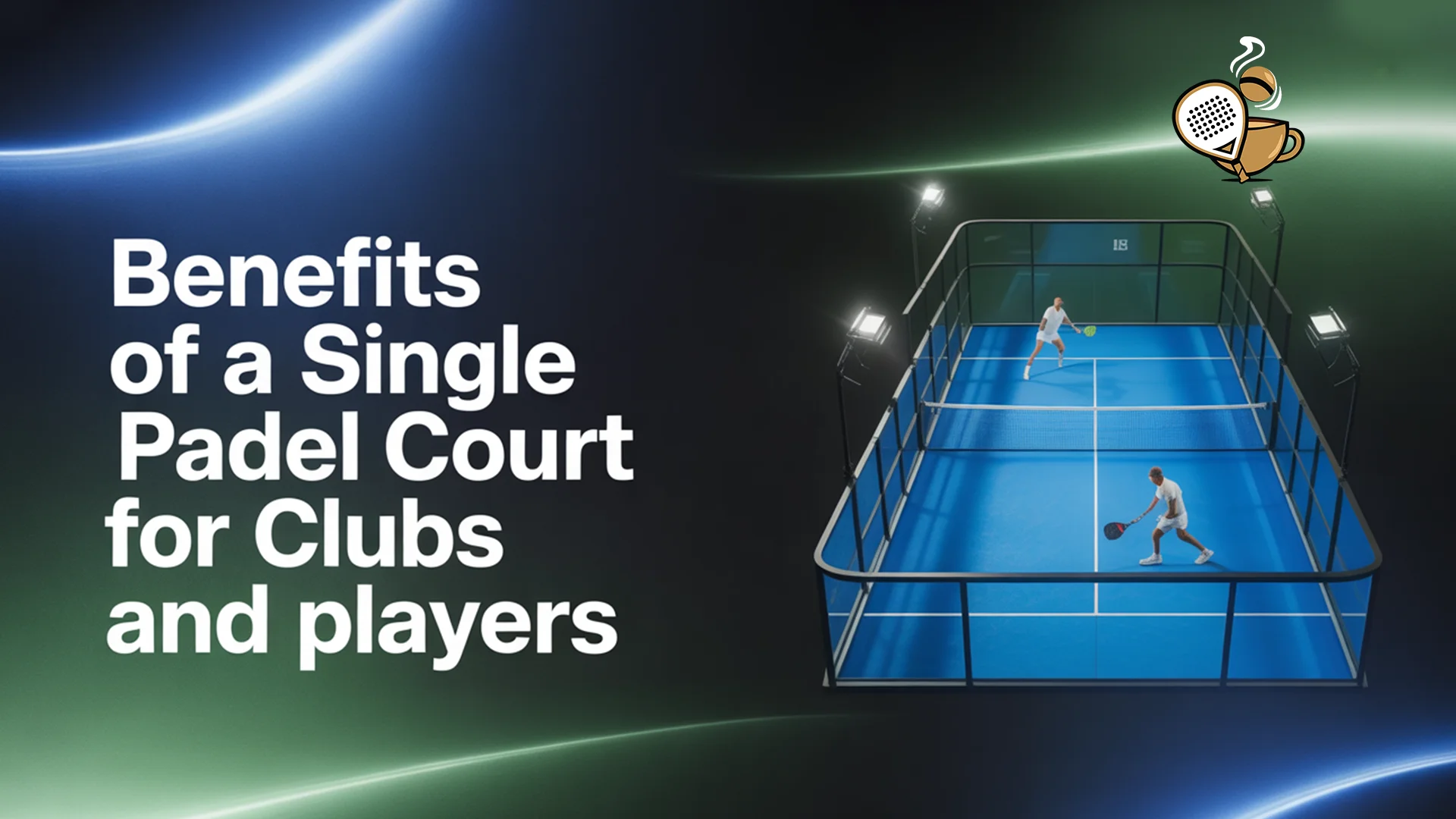When it comes to padel, a game played in doubles on a 20m x 10m court, is what comes to mind. However, there’s more! True, padel is often played in a padel court that accommodates and is meant for four players. However, not every club has the space or budget to build large doubles courts. And that’s where the single padel court steps in.
Compact, affordable, and exciting to play on, single padel courts are now proving to be a smart choice for clubs and for players. Imagine being able to fit and play padel into spaces once thought impossible, like rooftops, gyms, or even private homes. This article explores how one compact court for padel in singles can bring big benefits for both clubs and players.
Single Padel Court Dimensions
Before taking a deeper dive into the benefits of a single padel court, let’s first understand its dimensions.
| Measurement | Dimension |
| Length | 20 meters |
| Width | 6 meters |
| Comparison: Doubles Court | 10 m wide × 20 m long |
Despite being narrower, the court keeps the same 20-meter length, which ensures padel’s signature fast rallies and dynamic volleys remain intact. Everything else – walls, artificial padel turf, net height, and general rules – stays consistent with traditional padel structure.
The best part is that the smaller layout does not influence the game’s essence — it only adds to the fun and flexibility of the game.
This slimmed-down court version, about 60% of the width of a doubles court, provides several benefits for the players. The most important being the accessibility of space for padel court construction in tight spaces like rooftops, compact gyms, or private backyards.
Head-to-Head: A Quick Comparison
| Feature | Single Padel Court (1v1) | Doubles Padel Court (2v2) |
| Size | 20m × 6m | 20m × 10m |
| Space Efficiency | High | Lower |
| Cost (Build/Operate) | Lower | Higher |
| Booking Flexibility | Excellent (only 2 players needed) | Harder (need 4 players) |
| Physical Demand | Higher (whole court solo) | Shared between two |
| Skill Development | Focused, precision-oriented | Broader, communication-based |
| Social Interaction | Limited | Strong |
This table shows how single courts shine in adaptability, cost-effectiveness, and individual improvement—but trade a bit of social energy and teamwork in return.
Why Clubs Love the Single Padel Court
Now, let’s explore the benefits sports clubs can reap by installing single padel courts.
1. Space-Saving
Single padel courts measure 20m × 6m, versus the 20m × 10m for doubles. This means this court only requires 60% of the space needed for the double padel courts. This area reduction allows clubs to build more courts or install one or two in regions where they couldn’t fit in before.
2. Lower Build & Operating Costs
An established truth: smaller courts need fewer materials, simpler lighting, and less maintenance. It, in turn, leads to significant savings during court construction and future maintenance. Clubs can easily stretch budgets further to deliver new offerings.
3. Boosts Court Utilization
Smaller courts give clubs an added advantage. In these courts, there’s only one player on either side of the court, and they also take up less space. The clubs can then install more courts and arrange for multiple matches simultaneously. While this reduces wait times, it also maximizes overall court utilization.
4. Perfect for Skill Work and Training
Practice is what ensures a winning match. Practice improves your court movements, focus, and gear handling ability. And all this is best achieved when playing padel in singles.
You face no distractions from teammates; it’s just you and your single opponent on the other side of the court. You can easily focus on the incoming shots, work on your footwork and court movement, and enhance your shot selection capability.
Why Players Find Singles Padel Irresistible
Padel is all about “players enjoying the thrill in the court.” So, let’s explore how single padel courts enhance the game’s thrill for the players.
1. Fewer Opponents
When playing on a singles court, you only face one opponent on the other side of the court. In this way, you only have to cater to one person. You can maintain a 100% focus on the opponent’s strikes. And let’s not deny, you learn better when you are practicing alone on the court with just one opponent. You get to play all the incoming shorts, which helps in improving your court movements, agility, and decision-making.
2. Fitness with Fun
Being alone in the court keeps you in control; it also demands good agility, stamina, and endurance. In this way, you can ensure you remain fit for the gameplay, while also enjoying the thrill of the game.
3. Mind Sharpening
When playing singly with only one opponent, you need to own every shot and every mistake. This accountability sharpens your focus, improving your accuracy and smart decision-making skills. Ultimately, it reflects in your gameplay as an improved padel-playing technique.
4. Privacy & Peace
Playing singles means fewer distracting voices, fewer interruptions, and a more peaceful game. With only one opponent on the court, you gain a sense of privacy. This privacy and peace make it easier to focus, stay composed, and polish your technique with confidence.
Final Thoughts: Small Court, Big Impact
A single padel court offers a smart, space-friendly upgrade that gives clubs and players more flexibility, affordability, and training value. Such courts offer a focused, energetic gameplay that can sharpen technique, boost fitness, and make padel more accessible. True, these courts are not a replacement for doubles, but a powerful complement, and sometimes, that’s all you need to elevate your padel game.
Frequently Asked Questions
What is the most popular food street in Lahore?
Anarkali, Shah-Alami Market, or even Gawalmandi are areas where you can find the most popular food street in Lahore.
What is the most famous food in Lahore?
The following are some of the famous foods in Lahore:
- Biriani
- Halwa puri
- Nihari
- Paye
- Daal chawal
- Channay
Are these restaurants family-friendly?
Yes. Many of these spots have family-friendly menus and comfortable seating for all ages.




0 Comments